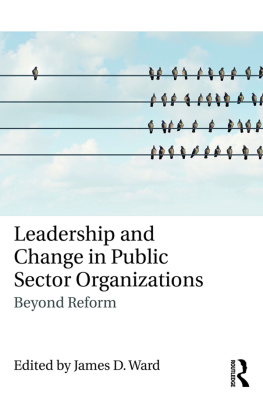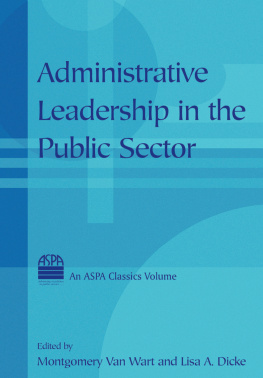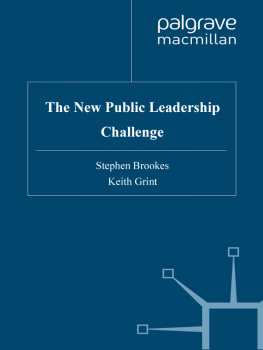Managing in the Public Sector
Managing in the Public Sector is a casebook designed with maximum instructor flexibility and student engagement in mind. Featuring cases brief enough to be covered in the last few minutes of a class as well as those substantive enough to last the entire hour, this elegant little book serves a multitude of course needs, whether thats illustrating theoretical concepts, encouraging active student participation, transitioning between topics, or integrating different approaches to administrative study.
Retaining the first editions use of focused, real-life-inspired cases to help students understand the application of theoretical concepts, the second edition also includes:
New chapter introductions featuring overviews of major leadership and ethical theories to provide students with the context they need
New and extensively updated cases throughout
Discussion questions at the end of each case to facilitate critical analysis and classroom discussion
An expanded chapter on ethical analysis
A new section on how to make logical arguments
A cross-listing of all cases and subject matter in an appendix for quick topical reference.
Now even more enmeshed in the literature of ethics, leadership, and public administration, Managing in the Public Sector, Second Edition provides authentic, hands-on experience of the decisions public administrators must face throughout their careers. It is an ideal casebook to supplement undergraduate and graduate public administration, leadership, human resource management, or administrative ethics courses.
Brett S. Sharp is Professor of Public Administration and the Founding Director of Leadership Studies at the University of Central Oklahoma, USA.
Grant C. Aguirre is Assistant Professor of Marketing in the College of Business at the University of Central Oklahoma, USA.
Kenneth Kickham is Professor of Public Administration at the University of Central Oklahoma, USA.
Managing in the Public Sector
A Casebook in Ethics and Leadership
Second Edition
BRETT S. SHARP ,
GRANT C. AGUIRRE ,
AND
KENNETH KICKHAM
First published 2017
by Routledge
711 Third Avenue, New York, NY 10017
and by Routledge
2 Park Square, Milton Park, Abingdon, Oxon OX14 4RN
Routledge is an imprint of the Taylor & Francis Group, an informa business
2017 Taylor & Francis
The right of Brett S. Sharp, Grant C. Aguirre, and Kenneth Kickham to be identified as authors of this work has been asserted by them in accordance with sections 77 and 78 of the Copyright, Designs, and Patents Act 1988.
All rights reserved. No part of this book may be reprinted or reproduced or utilized in any form or by any electronic, mechanical, or other means, now known or hereafter invented, including photocopying and recording, or in any information storage or retrieval system, without permission in writing from the publishers.
Trademark notice: Product or corporate names may be trademarks or registered trademarks, and are used only for identification and explanation without intent to infringe.
Library of Congress Cataloging in Publication Data
Names: Sharp, Brett S. | Aguirre, Grant, author. | Kickham, Kenneth, author.
Title: Managing in the public sector : a casebook in ethics and leadership / by Brett S. Sharp, Grant Aguirre, and Kenneth Kickham.
Description: Second edition. | New York : Routledge, 2016. | Includes bibliographical references and index.
Identifiers: LCCN 2016008661 | ISBN 9781138684775 (hardback : alk. paper) | ISBN 9781138684799 (pbk. : alk. paper) | ISBN 9781315543635 (ebook)
Subjects: LCSH: Public administrationMoral and ethical aspectsUnited States. | Public administrationMoral and ethical aspectsUnited StatesCase studies.
Classification: LCC JK468.E7 S53 2016 | DDC 172/.2dc23
LC record available at http://lccn.loc.gov/2016008661
ISBN: (hbk) 978-1-138-68477-5
ISBN: (pbk) 978-1-138-68479-9
ISBN: (ebk) 978-1-315-54363-5
Typeset in Sabon and Bell Gothic
by Keystroke, Station Road, Codsall, Wolverhampton
CONTENTS
CHAPTER 1
A Primer on Ethics in Public Administration
PART I
Theories of Leadership
CHAPTER 2
Contingency Theory and Leadership
CHAPTER 3
Dialogic Leadership
CHAPTER 4
Charismatic Leadership
CHAPTER 5
Transformational Leadership
CHAPTER 6
Paternalistic Leadership
CHAPTER 7
Pragmatic Leadership
CHAPTER 8
Caring Leadership
CHAPTER 9
Sandpaper Leadership
PART II
Ethical Context
CHAPTER 10
Organizational Climate
CHAPTER 11
Managerial Ethics
CHAPTER 12
Organizational Integrity and Prudence
CHAPTER 13
Accountability
CHAPTER 14
Open Government and Transparency
CHAPTER 15
Competition and Regulatory Ethics
I nstructors and students found the first edition of Managing in the Public Sector to be a wonderful catalyst for thoughtful and lively classroom discussion. Now revised, reorganized, and expanded, our primary goal in this second edition remains to spice up the classroom experience with engaging mini-case studies. We wanted to freshen the topics covered but still maintain a high degree of continuity, given the success of the last version. Our book is unique in the current market for two reasons. First, it features many brief case studies in which students can reasonably address the issues during a single class period. Some cases are sufficiently substantive to sustain productive dialogue through an entire hour. Others are brief enough to be covered in the last few minutes. Instructors can use these cases to quickly change the pace of classroom dynamics, make a transition between topics, illustrate theoretical concepts, integrate different approaches to administrative study, make the most use of available class time, and encourage active student participation. Although it was not part of our original plan, we discovered that Managing in the Public Sector proved to be an extraordinary pedagogical tool for online courses as well.
Second, although many of these stories have been inspired by real-life experiences to provide an air of authenticity, all of the cases are original fictional narratives. This deliberate fictionalization keeps the cases self-contained, narrows the scope to the issues at hand, and prevents them from being dated too quickly. If your students discover (or think they discover) the real story upon which a case is based, encourage them to use it as a precedent to help them analyze the case at hand. What decisions were made in the real case and what were the consequences? What lessons can be learned that can be applied in the new case? Real public administrators often look to precedents in their own organizations history or from other jurisdictions to guide current decision making.
Many of these case studies have been polished over time as we have used them extensively in our classrooms and training workshops. This casebook can serve as a supplementary textbook for general public administration, leadership, human resources management, or administrative ethics courses. To help meet the needs of the instructor, all of the cases are cross-listed among various categories (see Appendix). Discussion questions are included at the end of each case to facilitate critical analysis and discussion.














